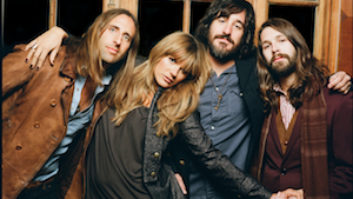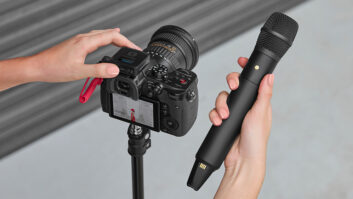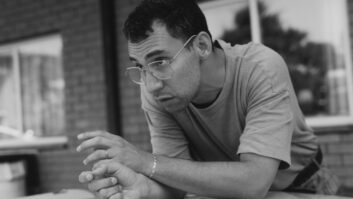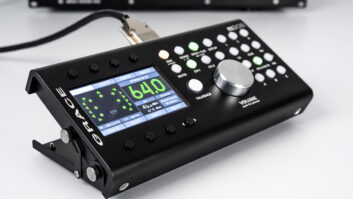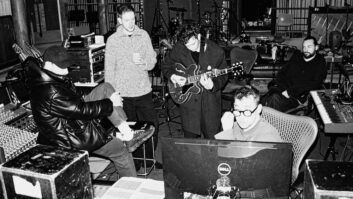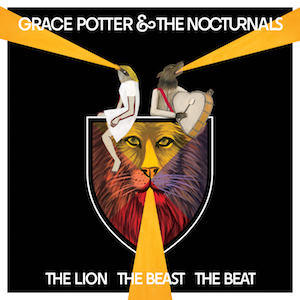
The Lion The Beast The Beat album cover.
EXTENDED INTERVIEW WITH PRODUCER/ENGINEER JIM SCOTT
When the group first came into your studio, were there specific things they wanted to change about how they worked, or how they wanted their record to sound compared to their previous one?
Actually they loved making their previous album. They did it in Hollywood and they had a really great time. It had some great songs on it, and obviously she had a hit with “Paris.” But it wasn’t quite as rock ’n’ roll and it wasn’t as free as the record we made. It was a little more careful, more “studio” than our studio record. Ours was rockin’. That’s what they do.
I went out and saw a couple of shows before we started working, and that’s something that doesn’t happen a lot these days. It used to happen all the time in the old days—The record company would fly you around and you’d go see a band and go on the road for a few days and hang out and get into their world. But in modern days with smaller budgets, they just hope for the best.
But when I saw them play live, this band blew me away. They really, really rock. And the records I heard were more like studio albums. So that’s what I brought into it. I wanted to let ’em loose—play loud guitars and hit the drums really hard. I encouraged Grace to play as much as she wanted to—on the previous album there’s not a whole lot of keyboards. But she’s incredible. She’s got it. She’s a great piano player and she’s also good on the B-3, which is not easy—it’s a very complicated instrument.
Was most of the material road-tested or written in studio?
Most of it was written either in the studio or just before. During the course of our album there were built-in breaks and there was a songwriting break, and we also had the holidays we had to deal with. So there was time for her to write songs. There were a few they had played out, but not the bulk of it.
Did they have demos?
There were demos which were charming. Grace doesn’t go into the studio to make demos. She makes them anywhere and everywhere—on her iPhone, on her laptop, with a drum machine, with a terrible keyboard, singing into the guitar pickup; anything to get the song idea down. I don’t think there were any full-band demos. There might be a drum machine, loops, keyboard a bass line. Matty [Burr] might get in some extra percussion on it. Very simple. It turned into what it turned into in the studio. That’s where the guitarists would usually get their sounds. And they’re a real team—they play with each other all the time. It’s not like “I’ve got my part and you’ve got yours.”
We had to shuffle through a bass change during the course of the record. We started it without a bass player. Cat [Catherine] had recently left and they were still moving forward and they hadn’t committed to a new bass player yet, so that was a big hole. Benny and Scott both took turns playing bass for the first round of sessions. It was a different thing, where instead of having the two-guitar assault, we had the one guitar assault with one of the guys playing bass. And they were great, but it wasn’t until later in the process when we had a full band and they added [Michael Libramento].
Why did you do some overdubbing at the Sunset Marquis hotel?
Grace is not good at hanging around the studio if there’s downtime. If I need an hour to do something, she doesn’t want to sit in the studio and do something else. She’d rather jump in her car and go to a store or go home or do something else. She likes to keep moving. So by working down in Hollywood, she was able to come and go if we were doing different things. Plus it’s a good scene. We’ve done similar things with other artists—renting a nice, fancy hotel room and bringing in some mobile gear can actually be cheaper than a fancy recording studio. It’s a little bit of an effort to move everything down there and set it all up, but once I had her standing in front of a microphone it was a work day.
How did you feel about the choice of Rich Costey to mix the record?
Oh, he’s great! Rich and I have worked on similar artists forever. We both have Foo Fighters credits, and others. He knows how to make super-modern hit records whereas I… don’t. [Laughs.] I know how to make rock records. My rough mixes sound like a rock band playing a rock album, and Rich’s mixes sound like a hit record. It’s a thing that you learn. Most of my clients want things a little less polished up—the Wilcos and TTV and the Chili Peppers and whatever. But I love hit records. And I hope this is one, and I was proud to have Rich mix it. He’s a friend and does a great job.
The strings were done later over at Paramount?
That’s right. That was crazy. At 5 o’clock one afternoon I got a call: “’OK, we’ve booked the string room for tonight at 7.” “Tonight? Like now?” [Laughs.] It was a real scramble. It was Grammy week and most of the studios in town were booked. But that Paramount room is a real classic old room. It’s an old rock ’n’ roll studio in the middle of Hollywood that was really happening in the ’70s, and then not so happening in the ’80s and ’90s, and then it was bought and it’s been returned to glory. It’s a great room.
We frantically set it up. Luckily [arranger] David Campbell is an old friend of mine and he’s great and always brings the best guys and we got a good sound. For miking we used mostly stereo pairs. We put mics over individual sections, but I also tried to get the best room sound I could. I used RCA 44s and U 87s and other obvious Neumann choices for the individual sections.
David has the best ear for melody, and he always serves the song. He puts interesting choices in each section, so it’s always a little more complicated than you think.
What was the work regimen like in general?
We started tracking in October and we were finished in January. But they had gigs in the middle of that and the holidays, etcetera. The process was we would get together and work as fast as we could cutting tracks, trying to get really rockin’ bed tracks, and then the overdubs were pretty quick. If something wasn’t working, we wouldn’t force it in there. There’s not a lot of layering of the guitars—some doubling, but it’s most adding sectional parts—like something’s going to come in this pre-chorus and something else has to come in the chorus. Sometimes it would be a keyboard and sometimes it would be a guitar. There’s quite a bit of percussion on there, too, which I love.
All the vocalizing, all the harmonies—it was the quickest I’ve ever seen it happen in my life. She doesn’t miss. She sings great, so comping her vocals is frustrating, because every one is great. You had to listen to the second and third and fourth take—if there was one—just so you didn’t leave some beautiful gem behind. But she sings in tune and expressively, and when she does backgrounds she can pick harmonies out instantly: “Give me a track—this’ll be the low one.” Bang. “This’ll be the medium one.” Bang, done. “This is the high one.” Okay, done. “Now I’m going to add one in between the high one and the medium.” I’ve spent hours with people doing that, and it’s like Spinal Tap, trying to find the harmony. [Laughs.] This was the exact opposite. She knows what she wants, where they’re going to go and there’s no messing around. It was really impressive and fun to watch and be a part of it.

Grace Potter
Photo by Williams Hirawkawa
MORE WITH GRACE POTTER
It must be interesting to play a headlining show tonight in a small place and then tomorrow to go to Nashville to play a half-hour set with Kenny Chesney and Tim McGraw in a stadium.
It is. We’ve been kind of exploding out on the stage, hopefully in a good way. I think we scare a few people. [Laughs.] When we first started getting into the stadium thing, I thought, “Maybe we’ll cater our set to the country crowd.” But at the end of the day we’re doing exactly what we always do. It’s been great. You work the catwalk, you talk to the crowd, you play big cock-rock chords, just give them every single piece of your energy. Now I know why people get so tired out from these shows. There’s something about giving your energy to that many people that’s really exhausting. I definitely have new respect for people who play big places all the time.
Did the success of your previous album affect the making of this one?
Well, it’s hard to draw any conclusions about the last record, because the first thing that happened with the last record is nobody liked it. [Laughs.] Then everybody liked it and it was everywhere! It got all this traction right as we were trying to start our new record. And all of sudden “Paris (Oo-la-la)” was everywhere. It’s a funny experience how a record takes hold of people. It takes a long time sometimes. On this one, right out of the cage, people are feeling connected to these songs and to the whole album as a body of work, so it’s been an amazing experience. That’s never really happened like this before for us.
Jim [Scott] was the king on this new one. Every time we’d finish a song he’d say, “You guys want to come in and listen to this Number One hit record?” He’s really the master at finessing a drum and bass sound from normal and great, to exceptional and heart-pounding.
How did not having Catherine on bass affect you?
It made it an interesting journey. Scott did a great job there at the beginning, but for me, I wasn’t able to hear the songs reach their full fruition, because there was always that hole—“What’s gong to happen when you add your other guitar part?”
The live sound is what makes us who we are; it’s what makes GPN good. People come to see the live show. So that’s why we asked Michael [Libramento, bassist] to come and join us in December. He came into the studio, met Jim, hecked out the studio. But that’s right when I put the brakes on. It was the right time to take a break and really reflect on where this record was going and where it was going to go. So poor Michael joined the band and immediately got a month-long vacation. [Laughs.]
But when we came back from a little sojourn, we actually went into a rehearsal space away from the studio. Jim wasn’t there, nobody from the record company was there. It was completely isolated, and we just played and played and played. I think we brought 14 songs into the rehearsal space and narrowed it down to the 12 that are on the record. Just from banging them out sort of letting the songs guide us and letting us as a band decide which songs played the most naturally and felt the most comfortable for us. Then we dug in deep.
Have the songs changed at all since you’ve been playing them out live?
Absolutely. They’ve been growing. We have a jam band backbone, where what we do depends so much on how the audience feels and reacts. It’s hard to say where these songs are going to go, but they’re all evolving.
